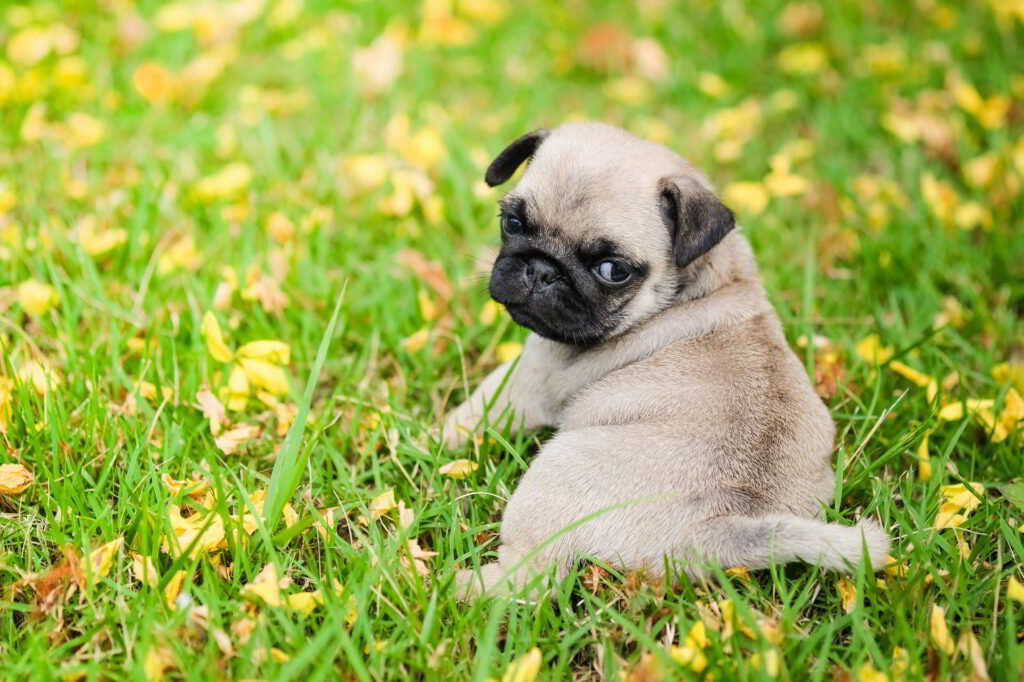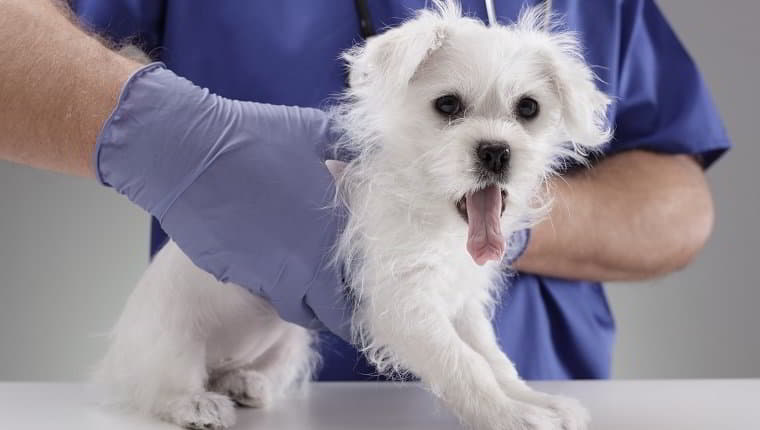A Nasty Little Parasite
Giardia can cause significant health problems in puppies. Similar to the protozoan coccidia, canine giardia infection typically affects younger dogs with underdeveloped immune systems, making them prone to diseases that older dogs can fight off.
What Is Giardia?
Giardia infection, or giardiasis, is caused by ingesting giardia, single-cell organisms (protozoan) that parasitize the small intestine. The disease is also spread through contact with infected feces. It can also be contracted by direct contact with feces from other infected pets. Reinfection from a pet’s feces is also common. Giardia is quite common in young pets-affecting up to half of all puppies. Many dogs can have no symptoms from giardia; however, in many cases, if it is left untreated, the intestinal parasite can wreak havoc on a puppy’s digestive tract, causing malabsorption issues which lead to malnutrition.

Symptoms of Giardia in Puppies
If five to 10 days after a hike in the woods your puppy suddenly comes down with a case of diarrhea, giardia could be the culprit. The stool may be mixed with mucus and blood or it may appear unusually soft and light-colored. Indigestion, refusal to eat, decreased energy levels, and a swollen tummy from gas and bloating may all present as symptoms in more seriously affected pets. If the infection persists, a puppy may have trouble gaining or maintaining weight, as the organism compromises its ability to properly process food. Of course, many asymptomatic cases are diagnosed, as some dogs may show no sign of illness, yet they still are infected. If you feel something’s off with your pup or his digestion, call your vet to schedule an appointment.
Causes of Giardia
The infective cyst stage of the giardia organism lives in the environment, mostly in standing water. When infected animals, such as deer or small mammals, defecate near water sources, the water acts as a medium for contracting the bug. Puppies tend to contract the organism by drinking from streams, puddles, or other contaminated water sources. Once the puppy is infected, the protozoa attach to its small intestine and begin a parasitic feeding stage. If possible, remove and replace any rocks or other outdoor items it may have come into connection with.
Treatment
Diagnosing giardia begins with a stool sample collected either at home or from the veterinarian’s office. Using a microscopic examination, the veterinarian looks for the protozoan in the sample. Diagnosis can be tricky because infected dogs pass the organism only intermittently and a fresh stool test could be negative, even when giardia is present. Repeated tests are often necessary to detect the tiny parasite. Your veterinarian may also test for antibodies that indicate your pet was exposed to the organcan bem. However, since many dogs never show symptoms and can fight off the infection on their own, a positive antibody test does not mean your pet is infected.
Technically, there is no drug specifically formulated for treating giardiasis in animals. So, giardia is typically treated with the prescription drug fenbendazole, a broad-spectrum anti-parasitic medicine used to also treat other gastrointestinal parasites like worms. Side effects rarely occur with this course of treatment and the drug is safe for both pregnant and lactating animals. Another option for treatment is certainly the antibiotic metronidazole. These medications can act stronger together, so in there foreme cases, animals will be given both medications simultaneously. Following a course of medication, repeated fecal exams are needed to confirm the presence of any existing organisms. To prevent the spread of giardia from your puppy to your family members, bathe him regularly, with gloved hands and shampoo, to remove fecal material and the associated cysts.

Giardia and Humans
If your puppy has giardia, there is little reason to panic about the risk to you and your fellow human family members. Giardia can be zoonotic, meaning it can be transmitted from animals to humans and then back again, however, the strains of giardia that infect dogs are uncommon in people and pet to human transmission is rare usually. Infections in people are much more likely to be caused by drinking contaminated water. The symptoms in humans are similar to canines and include diarrhea, gas, greasy stools, and other digestive issues. If you suspect a human infection, have your doctor test all family people, so that treatment can begin immediately. Young children, elderly adults, and anyone with a compromised immune system are especially at risk.
How to Prevent Giardia
You can prevent the chance of giardiasis by keeping your yard clean of feces. Environmental areas such as grass and standing water are tough to decontaminate, but when you’re out and about, restrict your dog’s access to unsanitary water to help prevent the chance of infection.
If your puppy was infected, do your best to clean any outdoor surfaces where it frequently defecates with a bleach-based cleaning product. The parasite then begins to divide and replicate itself causing distress to the puppy and sometimes destruction of the intestine. And wash all dog beds in hot water and laundry detergent. The more you can clean any home items that may harbor contamination, the healthier the outcome for your family.

Reinfection is common in dogs due to normal grooming behaviors. For this reason, it is important to make sure that there are no feces left on your dog’s fur afterward. If your dog has long fur, having the groomer trim the fur under the tail short so feces doesn’t get stuck in it can help. It may also be necessary to wash your dog’s bottom after it goes to the bathroom.
Giardia also commonly occurs in kennels and board withing facilities where the disease spreads rapidly due to crowded conditions. So, don’t board your dog until it’s about a year old or if it’s been diagnosed with giardia.
